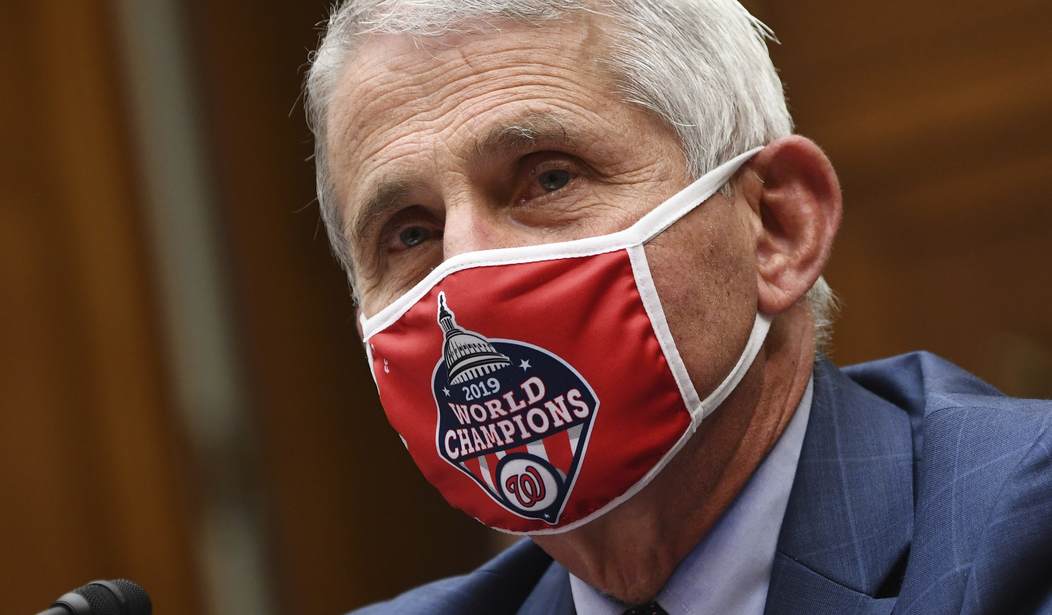His tone in responding to his critics has gotten noticeably edgier over the past six weeks, but then he’s also been under scrutiny lately to a degree unlike ever before in his long career. First came the burst of renewed interest in the lab-leak theory of the virus and the revelations that Fauci’s agency had funded EcoHealth Alliance, which in turn had given grants to the Wuhan Institute of Virology for bat virus research. Then came the publication of his FOIA’d emails, which every populist activist in America has been sifting through in hopes of finding some smoking gun or another proving Fauci’s ultimate culpability for the pandemic.
I think it’s wearing on him. How could it not be?
I mean, referring to yourself in the third-person is never a good mental space to be in:
After 37 years in his job, Fauci said puts “very little weight in the adulation, and very little weight in the craziness of condemning me.”…
“The more extreme they get, the more obvious how political it is … ‘Fauci has blood in his hands.’ Are you kidding me? … Here’s a guy whose entire life has been devoted to saving lives, and now you’re telling me he’s like Hitler? You know, come on, folks. Get real.”
He said that during the same NYT podcast interview in which he said this:
Dr. Fauci claims in a podcast that he hasn't flip-flopped on masks, etc.; it's just that new data emerged during the pandemic that proved their utility against Covid pic.twitter.com/4ZJatMoV6d
— Tom Elliott (@tomselliott) June 21, 2021
Is that right, that science and science alone affected his judgment on masks? Here’s one of the most famous quotes of the pandemic, given to The Street when he was interviewed by them last June:
So, why weren’t we told to wear masks in the beginning?
“Well, the reason for that is that we were concerned the public health community, and many people were saying this, were concerned that it was at a time when personal protective equipment, including the N95 masks and the surgical masks, were in very short supply. And we wanted to make sure that the people namely, the health care workers, who were brave enough to put themselves in a harm way, to take care of people who you know were infected with the coronavirus and the danger of them getting infected.”
The noble lie. Masks were useful but the public health bureaucracy didn’t want to say that lest the available supply of surgical masks be snapped up by frantic consumers, leaving doctors and nurses without. That’s not science.
But there was some science in the evolution of Fauci’s thinking on this, even if it’s not clear when precisely he evolved or what data caused him to do so. USA Today published a short but useful timeline a few weeks ago comparing things he was saying privately in his emails last February and March with things he was telling the public. As of February 2020, he seemed to believe sincerely that masks were useless for uninfected people. As late as February 22 he said in an email, “Which are the protective measures anyone should take against the new virus? Do masks work? The vast majority of people outside of China do not need to wear a mask. A mask is more appropriate for someone who is infected than for people trying to protect against infection.” Fauci seemed to think that masks might be helpful in preventing people who were carrying the virus from spraying it onto others. But for those who weren’t carrying it, what would be the point?
“There’s no reason to be walking around with a mask,” he famously told “60 Minutes” on March 8, 2020, just a few weeks before New York City’s COVID apocalypse began. It was sometime over the next three weeks that his opinion began to change. On March 30 he told the “Today” show:
Given the fact that there is a degree of transmission from asymptomatic individuals who may not know that they’re infected, we need to at least examine the possibility, as long as we’re absolutely certain we don’t take the masks away from who are health care providers who need them…
It doesn’t need to be a classical mask. But something that would have someone prevent them from infecting others.
He was saying the same thing in private by then. “There are some data from NIH that indicate that mere speaking without coughing elicits aerosols that travel a foot or two. If that is the case, then perhaps universal wearing of masks in the most practical way to go,” he wrote in an email on March 31. Those two data points may have flipped him — the fact that even some people without symptoms were turning out to be infected and infectious plus the fact that transmission in close quarters might have been easier than assumed, via simply speaking. Put those two together and he may have concluded that even a weak prophylactic like a cloth mask was better than nothing to try to limit the spread.
So why didn’t he recommend cloth masks from the very beginning in an abundance of caution, just in case the data ended showing up that spread by asymptomatic carriers was common? I … don’t know. I think that’s where the noble lie came in. Recommending cloth masks without firm data to support doing so would have caused a run on N95s and surgical masks as well, depleting the available supply. So he and the feds apparently chose to gamble that the science would eventually show that SARS-CoV-2 wasn’t the worst-case scenario, that maybe it was transmissible only when people were symptomatic and only by projecting particles forcefully, as with coughing. They lost their bet.








Join the conversation as a VIP Member